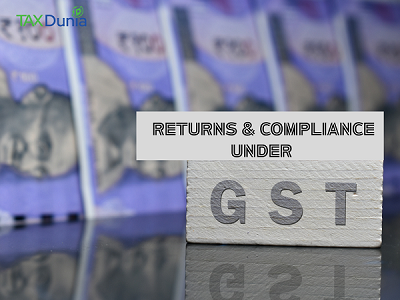Insights into GST Returns and Compliance Requirements
The Goods and Services Tax is an indirect tax that succeeds VAT and other indirect taxes applicable to the supply of goods and services. It is a more unified, streamlined, and destination-based tax that businesses with an annual turnover above a specified limit pay. Under GST, businesses have to file returns depending on the type of business and turnover limits. GST returns ensure that businesses are compliant with the rules and regulations of tax authorities. Here is offered to you a complete guide and insights into GST Returns and Compliance Requirements. You must know these requirements and returns, so that the business witnesses unhindered growth with no legal complications.
Key Insights into GST Returns
GST returns provide records of a business’s sales, purchases, tax collected on sales (output tax), and tax paid on purchases (input tax). Through filing these returns, businesses ensure that they are paying the tax liability that they owe to the government for making business transactions on sales and purchases. There are various types of return forms that businesses are eligible to file based on their category. The following are the returns under File Your GST Returns
GSTR 1
GSTR 1 records all sales of supplies of a taxpayer and contains details of taxable goods or services or both of outward supplies. For the QRMP Scheme taxpayers, it is to file quarterly by the 13th of the month following the quarter, and for taxpayers not registered under the QRMP, the due to file monthly is the 11th.
GSTR 2
It contains details of all the inward supplies related to taxable goods and/or services, along with ITC claims. Taxpayers have to file it monthly by the 15th of the following month.
GSTR 3
Containing details of the total tax payable, GSTR 3 records information about monthly returns based on finalised details related to inward and outward supplies. It is a monthly return to be filed by the 20th of the next month.
GSTR 4
Composition scheme taxpayers have to file GSTR 4 annually by the 30th of June of the following financial year.
GSTR 5
Every GST-registered taxpayer who is a non-resident person has to file GSTR 5 monthly by the 20th of the following month.
GSTR 6
GSTR 6 is a monthly return that the Input Service Distributor must file by the 13th of the next month.
GSTR 7 & GSTR 8
Parties deducting TDS must file GSTR 7 by the 10th of next month, and tax collectors and e-commerce operators must file GSTR 8 by the 10th of next month.
GSTR 9
Every registered taxpayer whose aggregate turnover exceeds a specified limit must file GSTR 9 annually by the 31st of December following the financial year.
GST Compliance Requirements
Registration under the GST is one of the most common requirements for compliance that businesses must comply with. Registration under the Goods and Services Tax ensures that a business engages with other parties legally. Therefore, before you start your own business, make sure that you have it registered.
Filing regular and timely returns is another compliance requirement that taxpayer has to do under GST. It ascertains that they are being fair and square with the tax authorities and paying the liable taxes.
Issuing e-waybills and e-invoices is very crucial under GST Composition Scheme. E-way bill ensures the smooth transportation of goods from one place to another. Under GST, registered persons transporting goods valued at more than Rs 50,000 cannot do this without issuing an e-way bill. Certain notified GST-registered businesses must generate an e-invoice for business-to-business (B2B) transactions. Proper invoicing is required to claim input tax credit.
Benefits of GST Compliance
Businesses or taxpayers witness an increased reputation when they maintain a GST-compliant status. Customers, suppliers, partners, investors, etc., are more likely to trust the business.
Compliance, especially filing returns and getting registered under GST, ensures improved access to input tax credit. ITC enhances the cash flow, allowing operational efficiency. High GST compliance ratings make sure that you are a low-risk entity and you are less likely to be audited more frequently. Fewer audits result in more focus on growth and operations rather than managing rigorous tax implications.
Get Started with TaxDunia
TaxDunia is a registered firm that offers consultancy services on taxation and finance. Let your business grow with professional guidance and handle the operation while the experts do the rather complicated paperwork.

